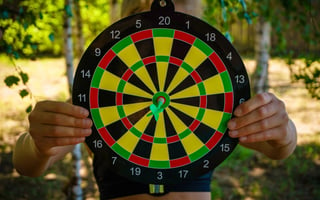It hasn’t felt like there have been many good news stories lately.
It has been a time of both celebration and controversy for followers of football in Newcastle.
The Saudi Arabian-backed £305m takeover of Newcastle United has been met with scenes of fan jubilation outside the stadium.
But, while they dream about long-awaited trophies, many others, including Amnesty International, have concerns the deal will be used as an attempt by authorities to sportswash – or distract from - the human rights situation in Saudi Arabia.
And, not surprisingly, that became a theme of questions faced by the woman who brokered the deal.
Amanda Staveley gave several media interviews after the takeover was completed, and there was a common mistake in her responses.
Let’s start by looking at an interview she gave to BBC Sport.
“It’s not ‘sports-washing’ at all”
— Dan Roan (@danroan) October 7, 2021
Financier Amanda Staveley tells me she “takes seriously” the concerns raised by human rights groups over the Saudi-led takeover of Newcastle Utd that she brokered, but insists “our partner is not the Saudi state”. pic.twitter.com/gx3Fbgozhu
Reporter Dan Roan asked about Saudi Arabia’s human rights record and followed it by asking whether the deal was an example of “sportswashing”.
Ms Staverley, now the club’s co-owner, replied: “No, not at all. It’s not about sportswashing at all. This is very much about the Public Investment Fund investment into a fantastic football team and a fantastic club. And we look forward to growing that club and developing it over the long-term.”
What was wrong with that answer?
Well, before we answer that, let’s take a look at how the same question was handled in a print interview.
Speaking to The Telegraph, Ms Staverley said: “I am obviously aware of the comments that have been made, and it’s something we take seriously and keenly. But our partner is not the Saudi state; our partner is the PIF (Public Investment Fund).
“It’s not sportswashing at all. It’s very much about the Public Investment Fund investment into a fantastic football team and a fantastic club.”
If you’ve been on one of our media training courses, I’m confident you will know the answer.
The issue is the repetition of the negative language. In her answers, Ms Staverley repeats the sportswashing phrase used by the journalists.
And, consequently, they have a neat quote, clip or soundbite of her using it.
It is a common mistake we often see during our media training courses and outside the training room. And it is easy to understand why it happens.
But, by repeating the negative language, you end up using controversial words that you would not choose to tell your story. And that can reinforce that negative association.
If you are involved in the takeover of Newcastle, you wouldn’t choose to use sportswashing when discussing it.
So, why do it in an interview?
The crucial thing to remember, and what we stress on our media training courses, is that you don’t need to repeat a negative to rebut it or defend yourself.
Ironically, in an interview with The Times, Ms Staverley showed how to do this.
Asked again whether it was “sportswashing”, she replied: “Absolutely not. If that was the intention, we would have bought a major franchise in the US; not a football club currently sitting in the relegation zone in the Premier League.
“This is about business investment and doing something special with a fantastic football club with the best fans in the world.”
Here, the negative accusation in the question has been tackled without mirroring and reinforcing that same language.
That said, I’m not convinced going on to speculate on what the investment fund would do if it was sportswashing is a great strategy.
But at least the response shows how you can avoid repeating the journalist’s negative language.
Spokespeople need to be aware, however, that the negative will often be more subtle than ‘sportswashing’. But it can be just as damaging.
For example, a reporter may say: “This is very disappointing, isn’t it? Aren’t you disappointed?” And spokespeople often respond with something like: “I wouldn’t say it is disappointing…”.
But they have.
Similarly, be careful about nodding your head in television interviews, particularly if the journalist has just said something critical of your organisation. Nodding implies you agree with what they are saying.
Back to Newcastle, and the questions about sportwashing will not go away – unlike the team’s kit, this is not a black and white issue.
And the people now running the club will need to find a way of answering them that does not involve using other people’s language.
About to face the media? Get your media interview homework off to the best start by downloading your copy of our free media interview preparation eBook.
Media First are media and communications training specialists with over 35 years of experience. We have a team of trainers, each with decades of experience working as journalists, presenters, communications coaches and media trainers.
Subscribe here to be among the first to receive our blog.




